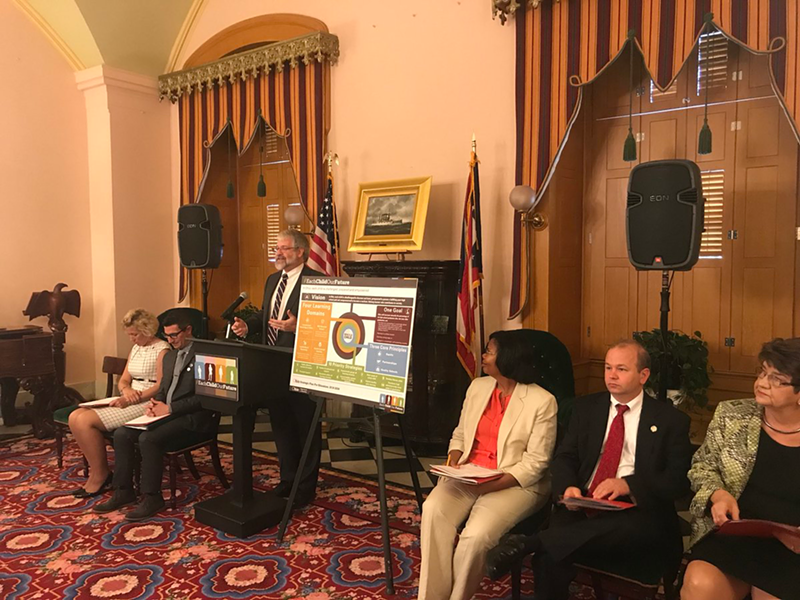The Ohio Department of Education wants to turn over a new leaf: less emphasis on testing, and more on building skills that will help students succeed after they graduate.
ODE’s new five-year comprehensive plan, called “Each Child Our Future,” purports to focus on “the whole child” in the state’s K-12 education initiatives, which employ 240,000 teachers in 3,500 schools serving 1.7 million students.
The strategies laid out in the 36-page plan are spread across four learning domains: Foundational Knowledge, Well-Rounded Content, Leadership and Reasoning and Social-Emotional Learning. Among them are emphasis on soft skills and critical thinking, including increasing efforts to grow social skills and self-awareness in young students and teaching problems solving, creativity, so-called “design thinking” and analytic skills.
The goal, according to the plan, is to increase the number of students who enroll in college, vocational training or an apprenticeship, are earning a living wage at a sustainable job or are serving in the military.
Work on the initiative began last July and included 150 educators, ODE board members, employers, community leaders, state lawmakers, students and others, as well as 1,200 attendees at 13 information and input meetings across the state.
There are a number of challenges Ohio schools face as ODE launches the new plan. More than 800,000 of its students — half of all the students in Ohio — are economically disadvantaged. More than 20,000 are homeless. Students are becoming increasingly diverse, as well, with more English language learners coming to Ohio’s public schools. And rapid changes in the world economy mean it’s difficult to know what, exactly, the jobs students are preparing for will be like.
“We’re living in this changing world,” ODE Superintendent of Public Instruction Paolo DeMaria said at the plan’s rollout in Columbus yesterday. “Who knows what the jobs of the future will look like? We have to take that obligation to not only educate our students in math and science and social studies and English, but also to equip them with the skills that will make them lifelong learners.”
The plan has 10 strategies to help move students toward those goals. Unlike past practices, which placed laser-like focus on standardized tests, ODE will look to find other ways to assess students’ learning outcomes to supplement state exams. Also on the agenda: providing more pathways to graduation for high school students.
“So many times, we’re looking at averages and numbers of students that are proficient or better,” DeMaria said at the rollout event yesterday, “and we clump students together when we really need to recognize that each child is different, each child has their own potential, their own inspiration, their own passions, their own interests and pathway to success.”
The rollout didn't quite manage to escape politics swirling around the state's education system. One of the speakers at the rollout was Ohio State Rep. Andy Brenner, a Republican who serves as chair of the House's Education and Career Readiness Committee. Critics, including Brenner's Democrat opponent for a State Senate seat Louise Valentine, accuse him of being too cozy with the charter school industry. Brenner has received more than $27,000 in campaign contributions from Bill Lager, the founder of the Electronic Classroom of Tomorrow. The online charter closed in January after the state announced it is seeking to recover $62 million related to lack of attendance among many of ECOT's 15,000 online students.
Democrats also dinged Brenner for the performance of Ohio's public schools during his tenure as chair of the House's Education Committee.
"Why would we let the guy who allowed Ohio public education to plummet from 5th to 22nd in the nation on his watch get anywhere near a strategic plan for Ohio schools," Ohio Democratic Party Chair David Pepper tweeted before giving a plug for Valentine in the coming state Senate election.
Charter schools are mentioned only once in the Every Child Our Future plan in a list of school options. Brenner, who has denied that he's been preferential to charters, was one of a number of lawmakers and other officials involved in drafting the plan.
"This has been an inclusive plan," he said at yesterday's event. "This isn't just one person's idea."


